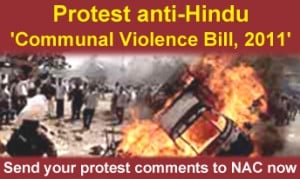Introduction – What is this bill and why to protest ?
Apparently ‘Prevention of Communal and Targeted Violence (Access to Justice and Reparations) Bill, 2011’ is brought to curb the riots taking place between majority and minority communities. After the alleged post-godhra riots in Gujarat, the so called secularists are going pillar to post to bring this enactment. So called social activists like Teesta Settlewad, Asgar Ali ENgineer are the people involved in pushing this draft bill.
O Hindus, please awake and send your suggestions to the National Advisory Council at [email protected]. You can also use opinion section in this campaign to send your comments/opinions to NAC. |
Prevention of Communal and Targeted Violence (Access to Justice and Reparations) Bill, 2011
The draconian provisions of the new Law
1. Protection to religious or linguistic minority and Scheduled Castes and tribes – It is directed to punish the offenses done or anticipated against a group which essentially comprises of a religious or linguistic minority and Scheduled Castes and tribes (Sec 1 (e)). Nobody else is given protection. If in certain area, hindu population is minority and attack is targeted against them or where the minorities themselves start organized attacks and riots, this law wont help to Hindus. Such is the viciousness of the draft bill. Crimes committed by the minorities will be prosecuted by the regular criminal procedure.
2. Curbing freedom of expression by terming it as Hate propaganda – Even publishing, communicating or disseminating of opposition may be termed as Hate Propaganda u/s 8 and is may extend to 3 years and/or fine. Again, it is targeted against the Hindu literature and and not anti-hindu literature.
Section 18 makes anything said or expressed against the minorities may be taken up as offence under this Act. The Govt. is to keep a constant vigil on this as to who is criticizing minorities, even fair criticizing may invite action by state else the public servant will be prosecutes – Sec. 18 – This provision may be misused widely even in the time of peace, for it is a continuing process.
3. Offenses to be non-bailable and cognizable – The offenses under the act are summarily non-bailable and cognizable even if they are not so under I.P.C. by virtue of (Sec. 11 and 58)
4. Government machinery will be made a slave to the minorities – Under this Bill, public servants will be under constant supervision and torture- dereliction of duty and it casts vicarious liability on them(Sec. 12 to 16). As also the victim can at any point of time gets a right to know the stage of proceedings and can complain to the National authority against the Govt. Machinery.
5. Obeying orders is not a defense – Apart from the vicarious liability, the order obeying police etc. can not say that they obeyed the orders. Even if one obeys an order of his senior, he also is a accused. In the times of riots or attacks, controlling the same will be too much difficult because of this. (Sec. 16)
6. Creation of a post – Defender for Justice and Reparations. – (Sec. 56) It appears that his sole activity will be to press for the rights of minorities.
7. Creation of National Authority for Communal Harmony, Justice and Reparation
- It shall have separate investigation agency with a Director General of Police GP. (Sec. 29)
- It’s advisories and recommendations will be binding on the State and Central Govt. (Sec. 32 (a) and (d) read with Sec. 29)
- It can interfere in the Court proceeding ( SEc. 32 j and k)
- It will have the status of a Civil Court.
8. The public servants like District Magistrate or Police Superintendent made directly answerable to the National Authority. (Sec. 72,29, 69, 71, 4138,39)
9. Presumption of guilt and burden of proof on the accused (Hindus) – The accused will have to prove innocence ( Sec. 74) This changes the entire legal proceeding against the hindu accused people.
10. More than one third of public prosecutors will be from the religious or linguistic minority. ( Sec. 78)
11. Provision for funds – There will be funds diverted from the Consolidated Funds of India in addition to the fines collected under this act which will be disbursed to the alleged victims.
12. Apart from punishment the convict will have to pay to the victim – Whatever is given to the victims are in turn subrogated from the the persons allegedly responsible for the loss of property, life or liberty (Sec 110)
13. Protection of action taken in good faith – All the persons acting under this Act will have blanket ‘protection of action taken in good faith’. ( Sec. 130)
14. This act is in addition to any other laws that are in force at present (Sec. 138)
Members of drafting and advisory committee ( Many of the members known for Anti-Hindu acts in the Name of Secularism )
Time Frame: August 1, 2010 – February 28, 2011
Drafting Committee Members
- Gopal Subramanium
- Maja Daruwala
- Najmi Waziri
- P.I.Jose
- Prasad Sirivella
- Teesta Setalvad
- Usha Ramanathan (upto 20 Feb 2011)
- Vrinda Grover (upto 20 Feb 2011)
Conveners of Drafting Committee
- Farah Naqvi, Convener, NAC Working Group
- Harsh Mander, Member, NAC Working Group
Advisory Group Members
- Abusaleh Shariff
- Asgar Ali Engineer
- Gagan Sethi
- H.S Phoolka
- John Dayal
- Justice Hosbet Suresh
- Kamal Faruqui
- Manzoor Alam
- Maulana Niaz Farooqui
- Ram Puniyani
- Rooprekha Verma
- Samar Singh
- Saumya Uma
- Shabnam Hashmi
- Sister Mary Scaria
- Sukhdeo Thorat
- Syed Shahabuddin
- Uma Chakravarty
- Upendra Baxi
- Aruna Roy, NAC Working Group Member
- Professor Jadhav, NAC Working Group Member
- Anu Aga, NAC Working Group Member
Joint Conveners of Advisory Group
- Farah Naqvi, Convener, NAC Working Group
- Harsh Mander, Member, NAC Working Group


